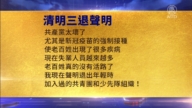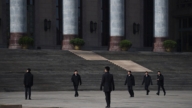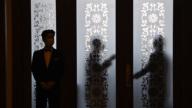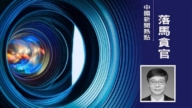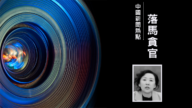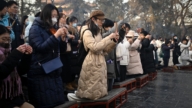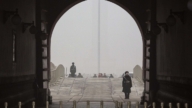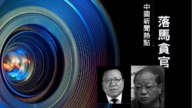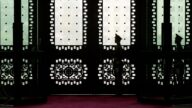【新唐人2013年12月13日訊】12月26號是中共前黨魁毛澤東120年冥誕,中共左、右勢力權鬥再度升級。原定毛誕在人民大會堂舉辦的音樂會,突遭腰斬﹔而原定開播的《毛澤東》電視劇,11號晚也被改播他劇。
中共左派近半個月來,大肆宣傳有關紀念毛澤東冥誕的文藝晚會。毛左們不僅請來大批毛澤東年代的音樂家參與演出,還預告有紀念毛的曲目。
不料,12月10號,晚會被要求審批,報批卻已經沒有時間,因此演出被取消。如今晚會已更名為《歌唱祖國》新年文藝晚會,原定所有歌頌毛澤東的曲目全部更換,改唱其他歌曲。
北京時政觀察人士華頗:「左派希望在12月26號,要大張旗鼓的紀念毛的120週年誕辰,但是當政者卻不願意,所以要給這種氣氛降溫,潑潑冷水,所以我看昨天(11日)電視劇播的是《聶榮臻》,沒有播毛澤東。」
11號,央視第一頻道原定開播的紀念毛誕一百集史詩電視劇《毛澤東》,最終也改播他劇。
旅美原大陸歷史學家劉因全認為,中共總書記習近平為代表的這一派,不希望把毛澤東旗幟舉得太高,這與前重慶市委書記薄熙來事件,和前政法委書記周永康事件有關。
旅美原大陸歷史學家劉因全:「薄熙來、周永康奪權的這個團夥,當時奪權的一個旗幟就是毛旗幟,而且他們這一搞,在國內掀起了一種向左轉的逆流,有一種回潮,就是有一批人在薄熙來和周永康的煽動下,就開始向左轉,搞極左的那一套,想恢覆文革那一套。」
劉因全表示,隨著「薄熙來案」落幕,和周永康被調查,相信習近平會逐步推行「去毛化」。
劉因全:「民間一大批有識之士,包括一些歷史學者,包括一些深受毛澤東其害的一些人的後代,他們都不斷揭露毛澤東的罪行,習近平小時候文革的時候就被抓過,蹲過監獄,他的父親更不用說了,是深受毛澤東的迫害,在這種時候如果習近平還去舉毛旗的話,人們會瞧不起他。」
「文革」期間,習近平受父親習仲勛冤案的牽連,未滿16歲就遭批鬥關押。
中國老記者鐵流認為,以宣傳部長劉雲山、和周永康為首的左派利益集團份子,一直打著毛旗號,阻礙社會向前發展。
中國老記者鐵流:「中國一定要解決毛澤東問題,不解決這問題,中國左派就要翻天,如果人民大會堂一演,毛左和權貴各個都跟著起來了,那還得了,中國的改革全部泡湯了,全部回巢了,這些貪腐勢力就更猖獗了。」
不過,回顧習近平上臺後高唱反腐,特別是近幾個月為了所謂的反貪,掀起的整黨整風中,多次引述毛澤東話語,加上他「紅二代」背景,被外界認為具有毛澤東色彩。習近平年初強調的「兩個不能相互否定」,更被解讀為意圖否定毛澤東的錯誤、想為「文革」平反。
華頗指出,習近平不是毛派,走的是中共前領導人鄧小平的路線,習只是用毛旗幟維持中共一黨執政,所以習對毛那套,需要的時候就打出來,不需要的時候就拋棄。
華頗:「習就奉行的鄧的路線,政治上打的四個堅持,就是中共的一黨執政,在經濟上甚麼都可以搞,但是政治上的不平等,必然導致經濟上的不平等,所以鄧的那一套,到今天負面效應已經達到了頂峰。」
鄧小平在任時推行的經濟改革,讓一部分人富起來,加速了中共領導人及其家族聚斂巨大財富,導致中社會貧富懸殊、貪腐遍地、官民矛盾不斷激化。
華頗說,習近平上臺一年來,只是調整一些利益分配問題,即使習在既得利益集團這一局中贏了,還是會產生新的利益集團,因此必須從根本上解決問題,那就是必須進行政治改革,放棄一黨專政,實行民主憲政。
採訪編輯/李韻 後製/陳建銘
Mao Anniversary Concert Cancelled Due to Party Infighting Between Leftists and Rightists.
In the last two weeks, leftist factions have created hype
around entertainment for Mao Zedong’s 120th anniversary.
Mao’s leftists not only invited a large number of musicians
from Mao’s time to participate in the performance.
They also disclosed some of the songs
that will feature in honor of Mao.
On December 10, the celebrations required approval.
They were cancelled for the reason
of not enough time given to approve it.
Today, the celebrations name has been changed
to “Ode to the Motherland" New Year Gala.
All the scheduled songs praising Mao Zedong were replaced.
Hua Po, Beijing political observer: “The leftists
want to remember the 120th anniversary of
Mao’s birth on December 26 with great fanfare.
The leaders are unwilling to do it,
and have poured water on it to cool it.
Yesterday, Chinese TV broadcast the series
“Nie Rongzhen", instead of “Mao Zedong".
On December 11, the CCP first television channel
had originally scheduled the launch of a one
hundred episode drama, called “Mao Zedong”.
This was to commemorate Mao’s birthday, but was replaced.
US-based Chinese historian Liu Yinquan believes
that the faction represented by CCP General Secretary
Xi Jinping does not want to promote of Mao Zedong.
This is because it is related to former
Chongqing Party Secretary Bo Xilai.
It is also related to the former secretary of
Politics and Law Committee, Zhou Yongkang.
Liu Yinquan: “Bo Xilai and Zhou Yongkang
used Mao Zedong as a banner to seize power.
There is a undercurrent of turning to the left in China,
under incitement by Bo Xilai and Zhou Yongkang.
They wanted to restore the Cultural
Revolution with an extreme left-wing.”
Liu Yiquan believes that Xi Jinping will gradually remove the
Mao Zedong system, with Zhou Yongkang currently under
investigation, and Bo Xilai’s case having taken place.
Liu Yinquan: “There are many witnesses, including
historians and children of those who suffered under Mao.
They are gradually exposing Mao’s crimes.
Xi Jinping was arrested in his childhood in
the Cultural Revolution; not to mention his
father who was persecuted by Mao Zedong.
People will criticize Xi Jinping if he
lifts the Mao banner up at this time.”
During the “Cultural Revolution", Xi Jinping was
involved in his father Xi Zhongxun’s injustice.
He was criticized and denounced in
jail while he was under the age of 16.
Chinese reporter Tie Liu believes the leftists, led by
Liu Yunshan and Zhou Yongkang, lifted Mao’s banner
to impede the development of Chinese society.
Tie Liu: “The Mao Zedong problem has to be solved in
China. Otherwise, the leftists would overturn society.
If Mao’s anniversary concert was held at the
Great Hall of the People, the Mao leftists and
various dignitaries would continue inhibiting
China’s reforms, and make corruption worse.
International observers reviewed
Xi Jinping’s anti-corruption campaign.
They concluded that he was more like Mao Zedong, and also
influenced by his Communist second generation background.
At the beginning of 2013, Xi Jinping stressed
the “two cannot be denied by each other”.
This has been interpreted as an intention to acknowledge
Mao’s errors, and also those of the Cultural Revolution.
Hua Po points out that Xi Jinping followed former
leader Deng Xiaoping’s route, but not Mao’s.
He was just trying to maintain one-party rule
with Mao’s theory, and used it as needed.
Hua Po suggests that Xi Jinping followed Deng’s route
to uphold the Four Cardinal Principles in CCP politics.
This means one party rule, but
with no restriction on the economy.
However, an imbalanced economy
would result in an imbalance in politics.
The negative effect of Deng’s
theory has reached a peak today.
Deng Xiaoping introduced economic
reforms to let some people get rich.
It accelerated the Chinese leaders and
their families amassing enormous wealth.
This has lead to the disparity of wealth in Chinese
society, corruption everywhere and intensification
of conflicts between officials and citizens in China.
Hua Po comments that Xi Jinping just adjusted
some distribution of benefits during his tenure.
There might be new interest groups coming
out, even though Xi won in the vested interests.
It is necessary for political reform to abandon one-party
dictatorship, and establish democratic constitutionalism.


